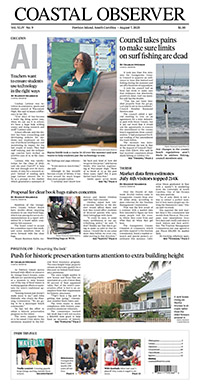Waccamaw High
Options for Junior ROTC hinge on budget

Residents in the communities outside of Pawleys Island sometimes complain that Waccamaw Neck schools get everything.
However, the only high school in the county that doesn’t have a Junior ROTC program is Waccamaw.
Principal David Hammel is working to correct that and he is taking his request to the Georgetown County School Board.
“We’re definitely excited about it,” Hammel said. “My community’s excited about it. Parents have been talking about it.”
Hammel believes between 80 and 120 Waccamaw High students would sign up for an Army JROTC program, which he said teaches leadership, discipline and teamwork.
“There’s a strong interest and I have a group of students that aren’t being served career-wise. I have a segment of students that would benefit greatly from it,” he said. “With the right instructor in the program, it will be magical, it will be special for those kids.”
Hammel has wanted a JROTC program since the first time he was Waccamaw’s principal.
In 2010, Randy Dozier, who was superintendent at the time, and the school board told Hammel it was “cost prohibitive.”
“It was a budget item for me a long time ago,” Hammel said.
When Hammel moved to the district office in 2018, Adam George became principal and continued the process of starting a JROTC program.
Hammel said George chose Army because he was told it was the easiest branch to get instructors for.
Hammel has the application ready to go, but needs to decide between two funding options.
The first option is to split the cost 50/50 with the Army.
Hammel said the district’s share would be $124,000 the first year and $93,000 a year after that. That money would cover curriculum, instructors, equipment and training supplies.
However, only about 10 schools a year get approved to start JROTC program and there are currently 270 schools on a waiting list for that option.
“I will be in the rest home if we take that plan,” Hammel said.
The second option is for the district to pay the entire upfront cost of $385,000 and $180,000 a year going forward. In that case the program could start immediately.
Within the next few months all of the district’s principals will submit “wish lists” of programs or staffing to the school board. At that time Hammel will ask to start the JROTC program.
It is up to the school board members to find the money for the program in next year’s budget.
At a retreat last month, two school board members anonymously cited starting a JROTC program at Waccamaw High as a priority.
Pamela Vereen, the district’s director of college and career readiness, said JROTC programs have leadership and employment skills built into the curriculum.
“Here’s an option for students to become career ready,” Vereen added.
Vereen said starting the program will also need the support of Superintendent Keith Price.
“We’ve added a lot of stuff, with 14 AP [courses] and everything else,” Hammel said. “It would be the biggest curriculum enhancement Waccamaw High will have ever had.”
Andrews and Georgetown have Navy JROTC programs.
“The program is not a recruiting program. It’s not to get them in the military, it’s to give them life skills,” Georgetown Commander David Kaiser said. “The No. 1 thing is a citizenship development program. Teach them how to be responsible, productive citizens in the community, the state, the country. We do that through the military leadership style.”
Kids are no longer taught things such as personal accountability and responsibility and leadership, Kaiser added.
“It gives you an environment where you can put your skills to use,” Cadet Lt. Comm. Briar Long said. “There’s no other place in school where I can go in there and use leadership skills. This has really prepared me for outside of high school. I’m ready now for whatever I want to be.”
Long knew when he joined the JROTC program that he wanted to rise in the ranks. Now he is hoping to continue his education in the U.S. Naval Academy.
Cadet Lt. (jg) Rowan Pelham is from a military family. Her father is a Navy veteran and her two brothers are currently serving. She became interested in JROTC after attending events after her brothers joined.
“I didn’t have a full grasp on everything it was but it’s a lot of work and you put a lot of time and effort into it,” Pelham said. “It’s really pushed me to take charge of a lot of stuff in my life. It’s put me out there a lot more than I used to be.”
Kaiser, a retired aviator, has been a JROTC instructor for eight years.
“The future of our country is in the youth and that’s where it needs to be,” Kaiser said. “I was a Scoutmaster for 10 years and I realized our kids are lost. That’s what attracted me to the program.”
“If you ask the seniors in our JROTC class, every single one of them will know what they’re going to do with their life and know they’re going to be something successful after high school,” Long said. “I don’t think you could say that if you went around and asked the senior class at Georgetown High School or any other school in our district.”
Because of the number of JROTC programs in the United States, the Navy has a moratorium on starting new ones.
Carvers Bay has a Marine Corps program taught by Maj. Donald Prograis, who served for 20 years in the Marines before retiring. It’s his second year at the school.
Prograis’ No. 1 priority is to prepare his cadets for life after high school.
“My focus is not purely on graduation. It’s how do I prepare you for the next steps in your life that can carry you for the next couple of years, and ultimately for the next 40 years,” he said. “I’m very passionate about all of my cadets succeeding not only in my class, but in life.”
Cadet Sgt. Maj. Asher Mezzatesta is Carvers Bay’s cadet commander. He joined JROTC as a freshman as an alternative to taking a gym class. He’s now a junior.
“After the first week when I saw all that we’d be doing with the physical fitness, with the drilling, with the academics, I kind of realized that I wanted to stay in a lot longer than I thought I would at first,” he said.
The biggest thing he’s gotten out of the program is “reliability,” he added, and it’s helped him learn to budget his time better.
After Mezzatesta did poorly in the first cross country meet of the season, Gunnery Sgt. Luis Betencourt, the school’s other JROTC teacher, ran with him every morning.
Mezzatesta shaved 7 minutes off his time by the end of the season.
“He was pushing to make me better and it worked,” Mezzatesta said.
Watching students like Mezzatesta grow in the program makes Prograis feel like he “has purpose.”
“It’s not a pat on the back, it’s that my work is not in vain,” Prograis added. “When I see those kids and their success and their growth, it lets me know, this is why I’m doing this. This is my purpose.”
As of last semester, 222 students were part of the district’s three JROTC programs.
South Carolina students need to pass one unit of physical education or one unit of JROTC to qualify for a high school diploma.




